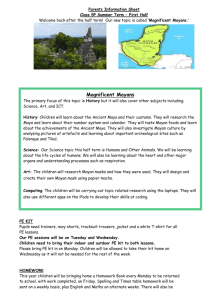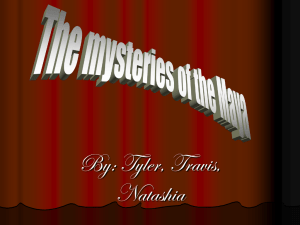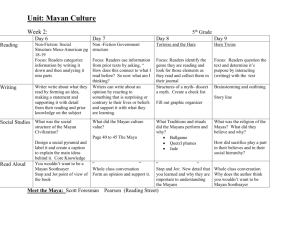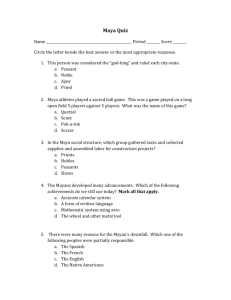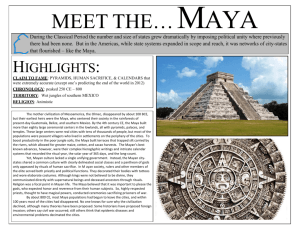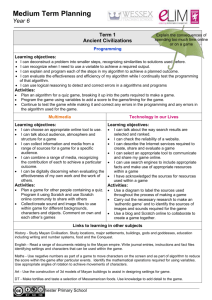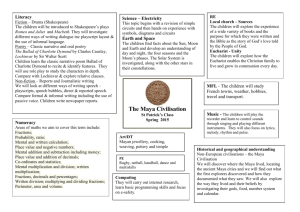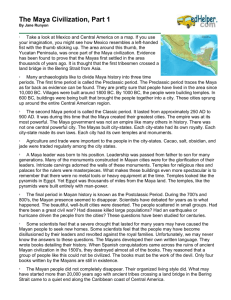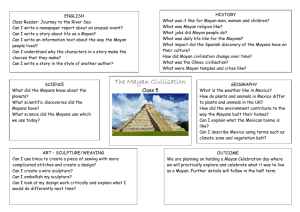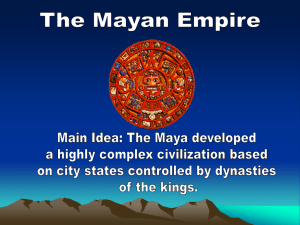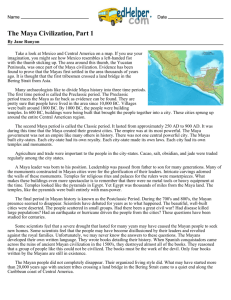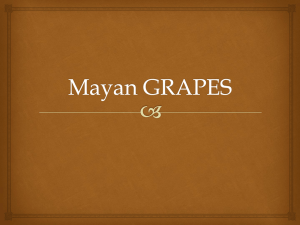All Saints* and St Richard*s Church of England Primary School
advertisement
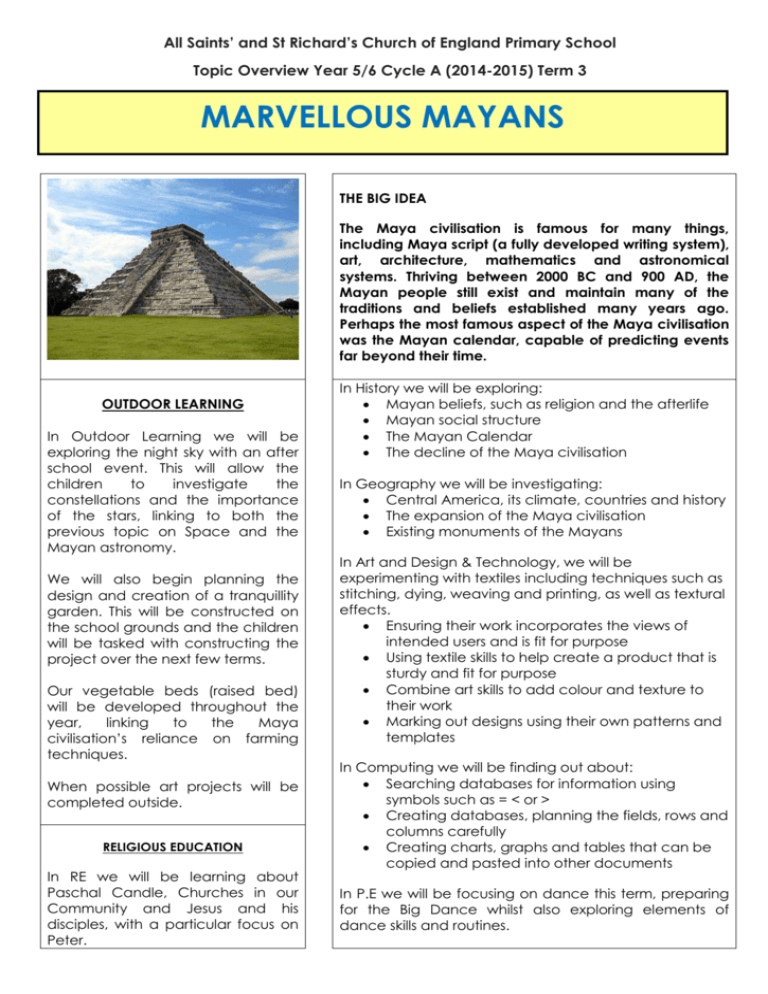
All Saints’ and St Richard’s Church of England Primary School Topic Overview Year 5/6 Cycle A (2014-2015) Term 3 MARVELLOUS MAYANS THE BIG IDEA The Maya civilisation is famous for many things, including Maya script (a fully developed writing system), art, architecture, mathematics and astronomical systems. Thriving between 2000 BC and 900 AD, the Mayan people still exist and maintain many of the traditions and beliefs established many years ago. Perhaps the most famous aspect of the Maya civilisation was the Mayan calendar, capable of predicting events far beyond their time. OUTDOOR LEARNING In Outdoor Learning we will be exploring the night sky with an after school event. This will allow the children to investigate the constellations and the importance of the stars, linking to both the previous topic on Space and the Mayan astronomy. We will also begin planning the design and creation of a tranquillity garden. This will be constructed on the school grounds and the children will be tasked with constructing the project over the next few terms. Our vegetable beds (raised bed) will be developed throughout the year, linking to the Maya civilisation’s reliance on farming techniques. When possible art projects will be completed outside. RELIGIOUS EDUCATION In RE we will be learning about Paschal Candle, Churches in our Community and Jesus and his disciples, with a particular focus on Peter. In History we will be exploring: Mayan beliefs, such as religion and the afterlife Mayan social structure The Mayan Calendar The decline of the Maya civilisation In Geography we will be investigating: Central America, its climate, countries and history The expansion of the Maya civilisation Existing monuments of the Mayans In Art and Design & Technology, we will be experimenting with textiles including techniques such as stitching, dying, weaving and printing, as well as textural effects. Ensuring their work incorporates the views of intended users and is fit for purpose Using textile skills to help create a product that is sturdy and fit for purpose Combine art skills to add colour and texture to their work Marking out designs using their own patterns and templates In Computing we will be finding out about: Searching databases for information using symbols such as = < or > Creating databases, planning the fields, rows and columns carefully Creating charts, graphs and tables that can be copied and pasted into other documents In P.E we will be focusing on dance this term, preparing for the Big Dance whilst also exploring elements of dance skills and routines. PERSONAL SOCIAL HEALTH & ECONOMIC EDUCATION In PSHEe we will follow the East Sussex Scheme of Work for Year 6. This term we will be focussing on: Going for Goals Sex and Relationship Education TRIPS AND EVENTS ‘Big Dance’ Mayans and Greeks crossover day – Who were the greatest? CURRICULUM RISK ASSESSMENTS Cooking Using apparatus in dance lessons in P.E. Being creative and imaginative in composing their own dances Performing expressively Ensuring that their movements are controlled and express emotion or feeling. Music is being taught by a music specialist. Throughout Year 5 /6 the children will have the opportunity to learn to play the recorder. French is being taught following the West Sussex Mixed Age scheme of work which runs over two years. This year we are following Cycle A. The children will be learning: How to say hello and goodbye, how they are feeling and the conventions of greeting people. Numbers up to 100 Directions and places around the town Food Animals Weather ‘Bear Hunt’ ENGLISH: In Literacy we will be looking at: Goodnight Mister Tom by Michelle Magorian, a dramatic, emotionally charged novel which explores themes like safety and trust, parenting, fear and loss. Children will be involved in discussion, debate and drama about the issues and characters in this story. This will include a focus on instructional writing, with the children exploring the new and unusual experiences for evacuees during the war. In grammar and spelling there will be a focus on various spelling rules as well as grammatical features such as adjectives, verbs and adverbs. MATHS: The children will be looking at addition, with a focus on column addition including decimal numbers. The children will be learning how to use formal written methods for subtraction. The children will also be learning how to use mental methods to solve both addition and subtraction problems. The children will also be exploring how to identify the volume of objects. The children will have the opportunity to begin exploring algebra, including identifying patterns and simplifying expressions. The children will also investigate how to read timetables correctly. SCIENCE: That light travels from a source, focusing on the light of the Sun That light cannot pass through some materials, and how this leads to the formation of shadows That light is reflected from surfaces (e.g. mirrors and polished metals) That we see things only when light from them enters our eyes CLASS ROUTINES: HOMEWORK: The children will have weekly homework tasks linked to learning in class. The homework will be sent home on Friday and is due back in school on Thursday. Children are expected to be heard read at least three times a week. Please make sure that you record each tie your child reads or is heard read in their homework diary. The children can then collect stickers towards their reading certificate. Spellings are sent home each week and need to be practised at home daily. Little and often is the best way to learn spellings. Children will be tested on their spellings each Thursday. P.E. LESSONS: The children need to have their P.E. kit in school each day and it should be taken home each Friday so that it is kept clean for lessons. Jewellery must be removed so if your child has their ears pierced they will need a small pot in their bag to put their earrings in to keep them safe. Long hair should be tied back for school, but it must be tied back for P.E. lessons so a spare hair band is a good idea. COMMUNICATION: Please encourage your children to speak to me if they should have any concerns, and of course I will always be available at the end of school if you wish to speak to me directly. I will continue sending home ‘ASK me about …’ cards so that you are able to talk about the children's learning at home. Please look out for these.
